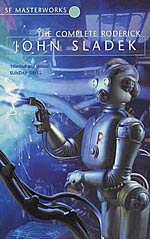
![]() Sable Aradia
Sable Aradia
10/1/2019
![]()
Read for the Science Fiction Masterworks Book Club (see the full list here.)
I'm not sure how I feel about this book. I think, on its surface, this was intended to be a New Wave influenced anti-Isaac Asimov. Sladek wanted to challenge the Laws of Robotics. Why should robots help or serve humanity? What reason do we give them to do that? Aren't these laws contradictory by nature? There's a really great section in the book, starting on page 232, where the character of Roderick, the title robot, breaks it down for a priest and causes a crisis of faith. It's kinda brilliant, actually.
But there are two books within this book (that's how they were originally published) and they differ in tone significantly. The first one was really hard to read. I think it was supposed to be funny, but it was a mean funny, in the manner of Kurt Vonnegut. Furthermore, I found the first book struck close to home maybe a little too much. For me, it was the saga of a neurodiverse kid growing up. Everything is confusing, people are inexplicably cruel, and you constantly wonder why people act like this and what you've done to invite that kind of cruelty.
I wondered if it was intended to be a dissertation on racism as well, in that it deals with how people are treated when they are dehumanized? Roderick has no need for food or water, so he won't die from neglect, but as a sentient program, he has to learn like a child, so he is neglected, emotionally abused, and even enslaved, and to me it's just a saga of horrific abuse. So if you've ever been abused, or if you're neurodiverse, this book needs a serious trigger warning.
It's also worth noting that this book, this classic of science fiction, would never be published today. It took almost 200 pages to get to the point. The readers at Baen might have given the first page a glance-through, but they'd have tossed it in the recycle bin almost immediately. So if you can't handle a slow read, don't waste your time. I would have given up on it myself, despite the fact that I can handle a slow read, if it weren't on my list of SF Masterworks that I'm determined to read as a self-education exercise.
On the other hand, the second book was a very different book, one which I found quite enjoyable, and you do kinda need the background of the first book in order to understand it. This is the part that most positive reviewers refer to as "a scathing satire," because it is. Humanity itself, and all the stupid and selfish and crazy things we do, are called into question. Roderick is just trying to get along and be a normal guy, but the world won't let him. If it weren't for the key conflict stringing it together -- a government-sponsored think-tank that believes true AI to be an existential threat to humanity -- it would seem like a random string of highly unlikely and zany adventures (most of which are depressing) where the key is to see how a character reacts. In fact, it does seem like that through much of the book. But by the end, you do see there is a logical thread that holds (most of) it together.
I'm giving it a four star rating because it was well-written, and I see its influence, and I also think it's just as relevant today (maybe more so) than it was when it was written in 1980. Also worth noting is that it lacks much of the overt sexism that many books of the period ooze from their very pores, and that's a plus. But in many (far too many) places it was hard to read, either for its depressing content or for its chaotic storytelling style that maybe has too much going on, thus almost obscuring its point. Definitely not a book for distracting yourself after work. It's a cerebral chew, even considering its sense of humour.
http://www.dianemorrisonfiction.com